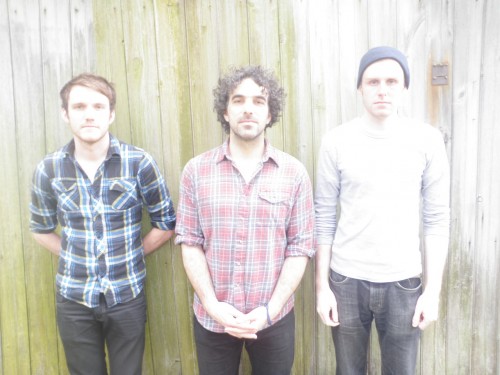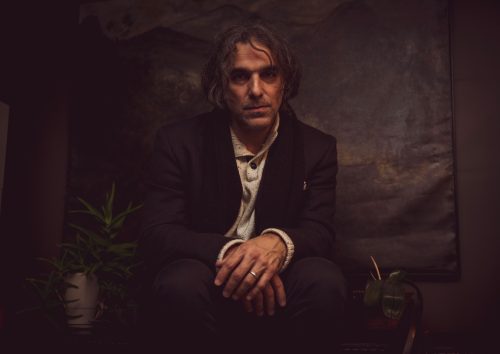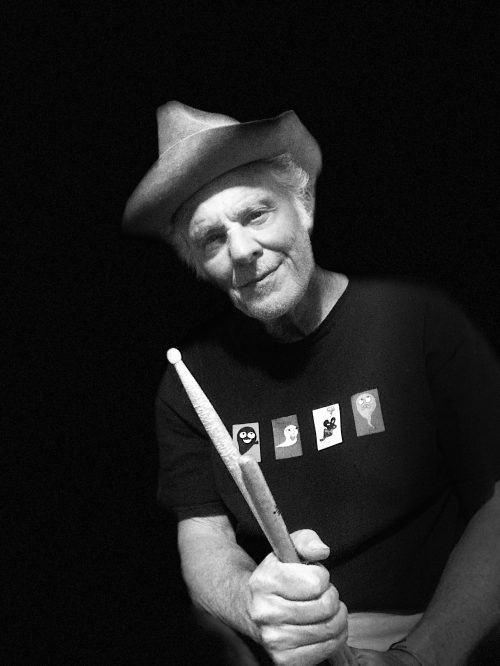By Michael Lello
Lou Rogai is an uncompromising artist who works on his own terms, whether leading his band Lewis & Clarke or his record label La Societe Expeditionnaire. He writes music inspired by his own life experiences and is not shy about explaining that he’s not writing for anyone else, although he hopes listeners find deep meaning in the music. With the label, it’s a similar approach, where art trumps commerce.
It has been since 2007 that Lewis & Clarke released its latest full-length album, “Blasts Of Holy Birth,” with an EP, “Light Time,” arriving in 2009. Now, with a current lineup comprised of himself and brothers Ian O’Hara and Shane O’Hara, Rogai is working on a new full-length Lewis & Clarke record. The band will perform at the AFA Gallery in Scranton Saturday, along with Mike Quinn. We recently had an in-depth chat with Rogai.
H81R: You’re playing the AFA Gallery with Mike Quinn on Saturday. You haven’t played there in about 15 years, right?
LR: I think it was 1997. In 1997 there was a band that I really liked in Scranton called Roger That Houston, and I joined that band and started playing with that band, and it was a really interesting experience. There was another band at that time, fresh out of high school, calledOkay Paddy (note: Quinn was a member). And there was a around Scranton called Jason Ei, and he was one of the most prolific indie musicians ever in the area, hands-down. He brought a lot of good music to Scranton. He always booked shows, accommodated out-of-town bands. He had the fire to make things happen, and Jason Ei was the lead writer and main guy of Roger That Houston, and he booked a show at AFA Gallery through a connection he had there, and I remember it being one of my favorite, most memorable experiences. Okay Paddy played, it was great. I think Brian Langan’s first project played, and it’s when all of us all started becoming friends and being aware of the music that one another was making while seeing what was happening with other artists coming in from other cities. It was a cool second wave of what I call Scranton’s golden age back when Scott’s Grocery building existed. I had a really good time at that show. It’s special that Mike and I haven’t played a show in quite a while, much less a place where we first ever played a show together. I’m really happy about that. I’m excited about his new record. Mike’s a talented individual.
H81R: The last release we’ve heard from Lewis & Clarke was “Light Time.” Did those songs indicate the direction you’re pursuing now, or has that changed?
LR: The whole reason for that EP was to accommodate a certain feeling at that time and, as with any expression there will be some remnants of that. I wouldn’t say that’s the direction that we’re trying to take it, because it’s ever-evolving.
H81R: You’ve had several changes to the band lineup over the years. Do you write differently when you have different musicians in mind? Do you specifically tailor the music to the lineup?
LR: I try to. I wish I was that deliberate, and I wish I had that much planning, but it’s all sort of accidental and incidental. The players that bring their own personal expression to each song, I try not to be too dictatorial about it and allow what the players feel to come through in the music, so naturally it’s going to change the textures and the landscape of each song.
H81R: Tell us about the work you’ve done on the new album so far.
LR: We started demoing in our practice place, and it did come out of “Light Time,” it did grow out of that, to reference what you asked earlier. There were musicians coming and going and collaborations happening, eventually the core being the O’Hara brothers and myself stripped a lot of stuff back and decided to get rid of any extraneous flourishes and really strip the material down to the important skeletal structures that work as gears, and the three of us are now working as three gears together, which is really interesting. Whereas with “Light Time” we were doing a lot of string experimentation, a lot of bowed string instruments; we decided to strip that all away and get right down to the root of it. So it stems from that, from smashing what we created and starting over again.
Lewis & Clarke: Shane O’Hara, Ian O’Hara and Lou Rogai (photo by T. Storm Heter)So we did these demos, and we were semi-happy with them. I wanted to stretch it out a little bit more and see what else we could accomplish, so we demoed it again, and eventually decided to work with Nick Krill in Delaware, a friend of a lot of people in Northeast Pennsylvania, and we started tracking there. And the first sessions there we ended up scrapping not because of the sonic quality but because of the performance. Once we sat with it for a while, I thought, you know what, this is not the proper direction, we’re not quite at the latitude and the longitude that we can be at. So we took a few sessions worth of the new album and just scrapped it and started over and redid it, and that felt really good, to not to have to settle for a certain performance. There has to be some sort of whim involved, some sort of surprise or accident, but when you have a clear vision of what you want and you don’t achieve that, it’s brave to say “Let’s throw it away and start over.” You do that five times, 10 times, now you’re approaching complete insanity.
We also tracked a lot at Tom Asselin’s studio. He provides a lot of atmospheric guitar work. And Shane tracked in our practice place, he tracked Molly doing a lot of the string arrangements that Ian and I came up with. And it’s been amazing working with Ian on arrangements. He’s my right-hand man as far as coming up with song structures and writing string arrangements, and what Shane provides as well, I feel really lucky to have them involved to the extent that they are. They’re integral parts. Lewis & Clarke wouldn’t sound the way it does without them, and it is my favorite incarnation yet.
H81R: So at what stage of the process are you in with the album?
LR: Well, we’re still tracking. We have what I thought was 110 percent of the tracking finished, but then I sat with the mixes and thought, you know, I don’t think this song’s going to belong on this record, and I also want to re-record this song, and then doing that sparked ideas for a new song that would act as a bridge between two other songs, and as the recording progresses, themes start to occur, things are tied together conceptually, and it’s at is happens, kind of like vines growing together to form some kind of shit, I don’t know. Some kind of tapestry, right? (laughs)
H81R: So you still have more songs to record?
LR: Yeah, it’s not like a sit down and write a song and say, “OK A to B, here’s the song.” It’s a certain thing I’ll play or a certain thing that will pop in my head or a line that I’ll have in my head or a verse, and that will turn into another layer, and then building blocks start to occur. I wish I could sit down and write verses and bridges and choruses and then I’d have a finished song, A to B, and I can’t. I used to be able to, but my brain doesn’t work that way anymore. It’s not part of the process for me. I like to see things crystallized and grow a little bit more than hammering it out. …
It’s a pleasure and it’s a joy. I just want to make it right, because if I put something out with my name on it, I want it to be a part of me and a part of the experiences I’ve been living. I’m not putting out songs for entertainment, really, I’m trying to put out work. And I don’t mean that in a presumptuous or pretentious way; I’m not capable of doing anything else.
H81R: Have you ever tried to write “popular” songs?
LR: I hate that. I try to make things that would be unpopular. I had an artist working with me on the label who said, “Yeah man, my whole new album is full of hit after hit after hit,” and I didn’t want to release the album, because to me, that’s someone with preconceived notions about what would be popular, and then creating something to fulfill what they think will be marketable, and that just makes me throw up. I like to write music that after someone’s listened to it a few times, they find a world within it, or they find some sort of feeling tugging at them, or some kind of relating to this kindred connection that we all have, and if that means that I won’t sell as many songs on iTunes because it’s not immediately catchy, then fuck ’em (laughs).
H81R: What challenges do you face in balancing your responsibilities with Lewis & Clarke and your record label?
LR: One hand helps the other, and I try not to separate them, and I feel that understand more about how to navigate the seas of cheese, as the Primus album referred to the music industry. I’m better at navigating that because of the work that I do at the label, but it came out of necessity. I had situations with previous labels that didn’t work out, so I knew I could do better if I had the ability to focus on it, and I feel that I’ve done that. I can do the best that I can do in each area of the daily task that I have to do, so I set aside time for writing, and I set time for working on the label. For me there’s no difference between house painting or working in a cubicle or working on the label, it’s just work, we have to work, we have to function. I don’t have the luxury of just living off of the music. I see people who are, and they have to makehuge compromises in what they create in order to live off it, and I refuse to do that.
H81R: You’ve said that your art reflects your life. Looking back on your previous art — your earlier albums — and the music you’re making now, can you sense how your life has changed?
LR: I do. Sometimes I don’t even see it, sometimes other people mention it to me. It surprises me, because sometimes I don’t even realize it. I don’t step back far enough to realize that it’s like a map or like a history of sorts. Sometimes I’m accidentally foreshadowing things to come, whether it be positive or negative things, that it’s almost like self-fulfilling prophecy. … It’s good to look back and see a little bit of growth and to learn from history, to learn from mistakes and learn from triumphs. I try to glance back, but mostly I like to exist right now. I try not to look too far ahead, I don’t like to look back, and I like to exist with what’s right now, and it’s always fun to take a few steps away and really see what’s going on.
H81R: And a primary part of your life right now is raising your son.
LR: My life is being dad, number one. That’s my number one. It’s not like I’m some guy off making records and doing the label and touring and then coming home and reacquainting myself with my child. That was a very choice and I live with that happiness every day. And it’s not detrimental to the music I make, its supplemental. It helps reflect the joys and triumphs and pitfalls that I’ve experienced being a parent, and that’s irreplaceable, and I wouldn’t trade a thing in the world for it, and that’s a big part of the record, and these things take time. Again, it adds to the experience. I could have more free time, more personal selfish time, and bang out three albums in the time it’s taken me to do one, but they won’t be as meaningful and they won’t be as thorough because of the lack of content.




Leave a Reply